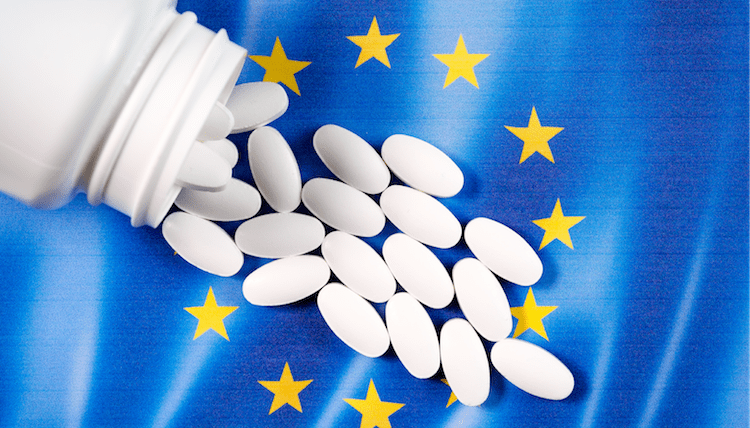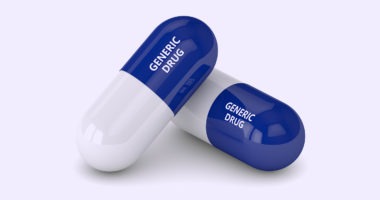EU’s Pharma Strategy: Secure the Supply Chain & Innovation
The industry is weighing in on the European Commission’s proposed Pharmaceutical Strategy for Europe, which sets forth a roadmap for innovation, manufacturing, and medicines supply in Europe, including the COVID-19 impact. What is the plan, and what is the industry saying?
Inside the proposed Pharmaceutical Strategy for Europe
Last month (June 2020), the European Commission (EC) launched the public input its proposed Pharmaceutical Strategy for Europe with the aim to “ensure Europe’s supply of safe and affordable medicines to meet patients’ needs and support the European pharmaceutical industry to remain an innovator and world leader,” said the EC in a June 16, 2020 statement. The EC had put on its agenda for 2020 a work program to develop a pharmaceutical strategy for the European Union (EU). EU health ministers met earlier this year (May 2020) to discuss the strategy and to begin to develop a five-year plan, for which certain key goals, such as providing access to medicines at affordable prices and ensuring the supply of medicines, has taken on greater importance in the wake of issues arising due the novel coronavirus (COVID-19) pandemic.
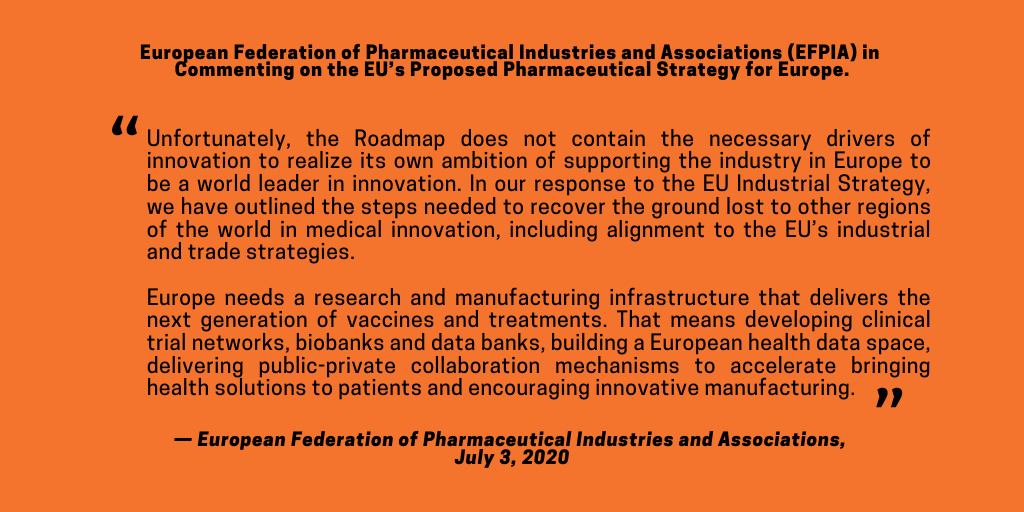
“The Pharmaceutical Strategy for Europe is a cornerstone of our policy in the area of health for the next five years, and this is the chance for all stakeholders to help us shape it,” said Stella Kyriakides, the EC’s Commissioner for Health and Food Safety, in the EC’s June 16, 2020 statement. “I call on patients’ associations, industry, public authorities, academia and the general public to contribute. With this Strategy, which I will present by the end of the year, we will be responding to the challenges amplified by the COVID-19 pandemic and all the structural issues on access, affordability and the strategic autonomy of our Union on medicines. We need to ensure that all patients have access to optimal care & affordable medicines. Together we will make a difference.”
The strategy aims to create what the EC terms a “future-proof” system, and is centered on several key themes: strategic autonomy and manufacturing of medicines, access to affordable medicines, innovation, and environmental sustainability and health challenges. Specifically, the strategy seeks to gain benefits of digitalization and promote innovation, especially in areas of unmet needs, such as antimicrobials, medicines for children, and medicines for rare diseases. It also intends to reduce the EU’s dependency on imports of active pharmaceutical ingredients (APIs), other ingredients, and pharmaceuticals from third-countries, meaning countries not part of the EU or territories of EU member states. In its statement, the EC points to the EU’s dependence on APIs necessary for the production of some generic medicines, including antibiotics, oncologic medicines and basic medicines, such as paracetamol/ acetaminophen, a common over-the-counter analgesic, from China and India. The EU’s pharma strategy also seeks to reduce the impact of medicines on the environment and specifically address antimicrobial resistance as it relates to antibiotics. Lastly, the EC stressed in its June statement that “the current COVID-19 crisis has shown that the EU needs to make sure that medicines, including vaccines, can be available under all circumstances.”
In forming the Pharmaceutical Strategy for Europe, the EC is examining legislative and non-legislative action in four specific objectives. The first goal is making sure that patients across Europe have new medicines and therapies in their countries quickly and under all circumstances and that there are fewer shortages of medicines. A second objective is to help to make medicines more affordable and increase the “value for money” of medical expenses. A third goal is to take advantage of digitalization and make sure that innovation and emerging science and technology caters to the therapeutic needs of patients while reducing the environmental footprint. The last goal is to reduce the EU’s direct dependence on raw materials sourced from non-EU countries and influence other countries to harmonize international standards of quality and safety of medicines and help European pharmaceutical companies compete on the global level on an equal footing. These goals are in line with the policy priorities of the EU’s Industrial Strategy for Europe, the European Green Deal, Europe’s Beating Cancer Plan, and the European Digital Strategy. In addition, the EU’s pharma strategy is seeking to take into account the weaknesses exposed by the coronavirus pandemic and factor in appropriate actions to strengthen the system.
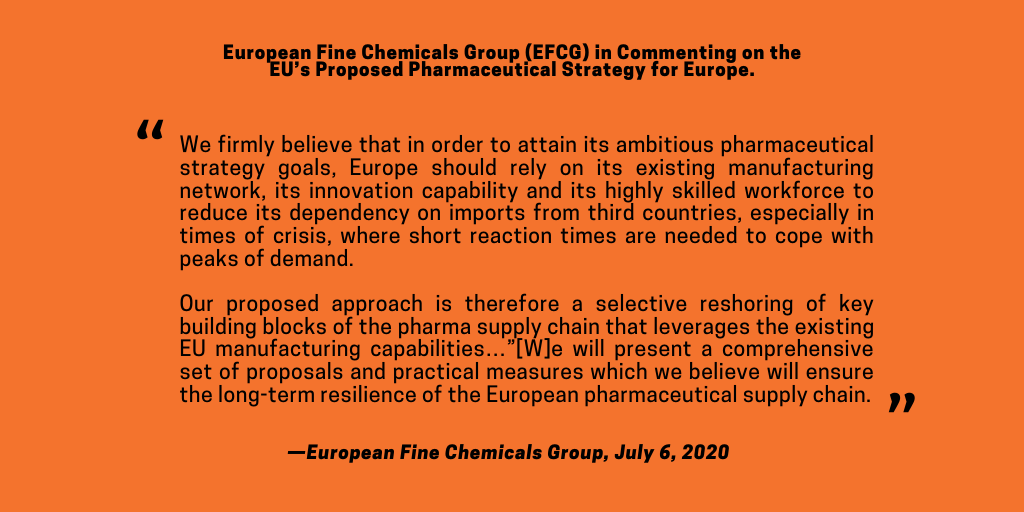
The public consultation on the EU’s proposed pharma strategy is open until September 15, 2020 with the goal of finalizing the strategy by the end of the year. In addition to the public consultation, the Commission also launched on June 2, 2020, a consultation on the Roadmap for the Strategy, which was open for public comment through July 7, 2020. In parallel to the consultation, the EC will also hold bilateral technical talks with stakeholders in the coming weeks and months (as reported on June 16, 2020). The EC is holding this week (July 14––July 15, 2020) an online stakeholder meeting to gather stakeholder questions on the strategy and specific areas of the strategy. The overall aim of the public consultation is to allow the public, experts, and stakeholders to contribute and voice their opinion on the best ways to address pharmaceutical-related issues in the EU. The results of the public consultation will contribute to the preparation, in the autumn of this year (2020), of the EU’s pharmaceutical strategy, which is expected to be adopted by the end of the year.
Industry feedback thus far
The public consultation is seeking stakeholder input on four major themes/questions, as outlined below, with manufacturing and supply of APIs being a key issue.
- International dependency and manufacturing: how to respond to the EU’s dependency on APIs produces outside its borders?
- Access to affordable medicines: how to make medicines more readily available, affordable and respond to shortages?
- Innovation: how to make sure that the EU remains on the forefront of patient centered innovation? and
- Environmental sustainability and health challenges: how to tackle the supposed impact of medicines on the environment and citizens’ health?
To date (as of July 7, 2020), more than 240 stakeholders have provided input, including the European Federation of Pharmaceutical Industries and Associations (EFPIA), which represents innovator, research-based pharmaceutical companies and national pharmaceutical associations; the European Fine Chemicals Group (EFCG), which represents fine-chemical producers in Europe and a sector group of the European Industry Chemical Council (CEFIC), which represents European chemical manufacturers; national pharmaceutical manufacturing or pharmaceutical associations in France, Germany, and Italy; national governments or government agencies in the EU (i.e., France, Ireland, Denmark, Austria); pharmaceutical companies (i.e., AbbVie, Sanofi, Novartis, Pfizer, Johnson & Johnson, GlaxoSmithKline, AstraZeneca, Roche, Biogen, Amgen, Merck & Co., Eli Lilly and Company, Takeda, Boehringer Ingelheim, Novo Nordisk, Merck KGaA, Teva, Bayer, UCB, Astellas, Servier, Ispen, Lundbeck, CSL); and healthcare associations, patient-advocacy groups, research organizations, and academic institutions. Highlights of some of that feedback are outline below.
European Federation of Pharmaceutical Industries and Associations (EFPIA). Although supportive of the process and plan for an EU-based strategy for pharmaceuticals, EFPIA said that the roadmap put forth by the EU thus far fails to meet key goals, including relating to innovation, manufacturing and supply.
“Unfortunately, the Roadmap does not contain the necessary drivers of innovation to realize its own ambition of supporting the industry in Europe to be a world leader in innovation,” said the EFPIA in a July 3, 2020 statement in commenting on the EU’s roadmap for an EU pharma strategy. “…Europe needs a research and manufacturing infrastructure that delivers the next generation of vaccines and treatments. That means developing clinical trial networks, biobanks and data banks, building a European health data space, delivering public-private collaboration mechanisms to accelerate bringing health solutions to patients and encouraging innovative manufacturing.”
To further support innovation, the EFPIA is calling for a strengthening of the intellectual property (IP) framework in the EU, including a harmonization of supplementary protection certificates (SPCs). ”To place the EU at the forefront of pharmaceutical innovation, Europe needs a world-class IP framework to attract investment into the development of future treatments for the benefit of patients, including for patients with rare and pediatric diseases,” said the EFPIA in its statement. “Developing incentives to further address unmet medical needs and seize advances in science is critical to tackling issues like AMR [antimicrobial resistance] and pandemic preparedness. SPC harmonization and strong IP systems can increase certainty and predictability for innovators and investors alike.”
European Fine Chemicals Group (EFCG). In its comments, the EFCG underscored the need to repatriate pharmaceutical manufacturing back to the EU to reduce vulnerabilities in the pharmaceutical manufacturing value chain in the EU, particularly for generic drugs, and for starting materials and process chemicals for both innovator and generic drugs. It is proposing a selective reshoring of key building blocks of the pharma supply chain that leverages existing EU manufacturing capabilities.
”To enable European patients to have access to their essential medicines, all components of the supply chain must be readily available,” said the EFCG in comments of July 6, 2020. “Whilst the APIs for innovative drugs are mainly sourced from Europe, more than two-thirds of APIs for generic drugs are sourced from Asia. However, for both innovative and generic drugs, most starting materials or critical process chemicals are sourced from Asia. Over recent years, structural shortages of medicines have been building up, as a consequence of weaknesses in the supply chain. The recent COVID pandemic only exacerbated this existing problem, highlighting the urgent need to significantly improve the robustness of the pharmaceutical supply chain and allowing the identification of its vulnerabilities. Bringing back to Europe essential processes and key building blocks and leveraging the existing EU manufacturing capabilities can go a long way towards achieving this goal.”
Other pharmaceutical manufacturing associations in Europe are also calling for measures to address offshore pharmaceutical productions, including SICOS (Syndicat de l’Industrie Chimique Organique de Synthèse et de la Biochimie), the German Medicines Manufacturers’ Association (BAH), and the Assogenerici (National Association of Generic and Biosimilar Medicines Industries).
SICOS (Syndicat de l’Industrie Chimique Organique de Synthèse et de la Biochimie). SICOS (Syndicat de l’Industrie Chimique Organique de Synthèse et de la Biochimie), the national industrial sector group representing the manufacturers of APIs, excipients and intermediates in France, addressed the EU’s dependence on Asia for APIs and other pharmaceutical ingredients in comments signed by 17 API and pharma ingredient producers in France. “As a consequence of the extensive outsourcing of much of the [pharmaceutical supply] chain, the European pharmaceutical industry is now particularly dependent on Asia, notably for the production of active pharmaceutical ingredients (API), pharmaceutical intermediates and regulatory starting materials,” said SICOS in its comments submitted on July 7, 2020. “The COVID-19 crisis has highlighted the dependency and vulnerability of the raw materials supply chain.”
In its comments, SICOS made proposals on how to increase and support API production in the EU, such as recording the source of APIs on drug packaging. It said would later expound on these measures as part of the public-consultation process; its initial proposals for action are outlined below:
- Identify weak areas within the supply chain for critical drugs, as well as all players throughout the entire value chain from raw materials through to APIs;
- Record the source of APIs on drug packaging;
- Build strategic stocks for critical APIs from European players;
- Give priority to European sourcing of raw materials for public tenders and reimbursable medicines (without hindering free trade). In all cases, priority should always be given to suppliers who comply with EU quality, safety, sustainability and environmental standards;
- Help companies invest in updating and developing the existing industrial network;
- Support the costs of technology transfer and development of repatriated molecules, and ensure regulatory flexibility (e.g. fast track approvals), in full compliance with regulatory standards, to prevent future shortages due to unforeseen events or surges in demand;
- Fund research into new and environmentally friendly processes;
- Strengthen more specifically the qualification criteria for foreign suppliers in terms of quality, safety and respect for the environment;
- Maintain and develop long-term training in Chemistry for vocational baccalaureate, universities of technology, and school/university studies; and
- Develop in-service training qualifications to increase the skills and expertise required.
German Medicines Manufacturers’ Association (BAH). The German Medicines Manufacturers´ Association (BAH), a pharmaceutical trade association of approximately 400 member companies, representing medicines manufacturers as well as allied groups, such as pharmacists, lawyers, publishing houses and agencies, as well as market research and opinion research institutions, also addressed the need to secure the pharmaceutical supply chain in Europe.
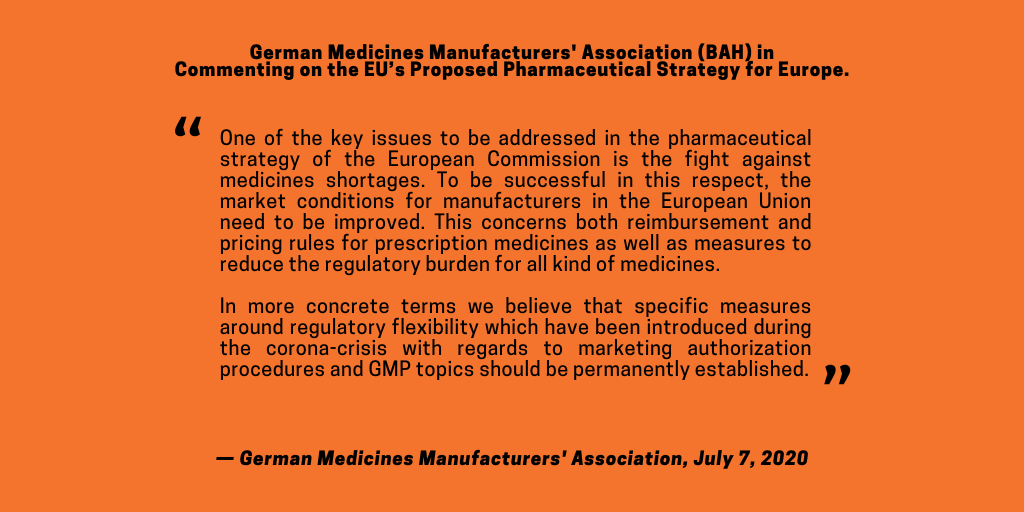
“One of the key issues to be addressed in the pharmaceutical strategy of the European Commission is the fight against medicines shortages,” said the BAH in its comments submitted to the EC on July 7, 2020. “To be successful in this respect, the market conditions for manufacturers in the European Union need to be improved. This concerns both reimbursement and pricing rules for prescription medicines as well as measures to reduce the regulatory burden for all kind of medicines. In more concrete terms we believe that specific measures around regulatory flexibility which have been introduced during the corona-crisis with regards to marketing authorization procedures and GMP topics should be permanently established.”
Assogenerici (Associazione Nazionale Industrie Farmaci Generici e Biosimilari, the National Association of Generic and Biosimilar Medicines Industries). Assogenerici (Associazione Nazionale Industrie Farmaci Generici e Biosimilar, the National Association of Generic and Biosimilar Medicines Industries), which represents generic-drug and biosimilar companies and manufacturers in Italy, also addressed manufacturing needs in the EU.
”…[A] strategy should support the global competitiveness of the industry by building on existing pharmaceutical manufacturing capacity (over 400 off-patent medicines manufacturing sites in EU) to further increase security and resilience of supply,” said the association in its comments submitted July 7, 2020. “It should also create strong incentives for finished products and APIs in Europe while rejecting national protectionism that would undermine the Internal Market and European solidarity. Supply-chain resilience and regulatory cooperation should also be part of a new medicines trade agenda based on security, access and mutual openness with key trading partners.”

